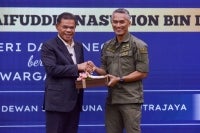Advocating smart and balanced approach to counter Islamic extremism

KUALA LUMPUR - In the ever-evolving battle against Islamist extremism, an expert calls for a more comprehensive and nuanced approach to understanding and addressing this complex issue.
USM Political Science Professor Dr Ahmad Fauzi said a more holistic understanding is required, going beyond conventional narratives.
"We can no longer afford to view Islamist extremism through a narrow lens. It's not just about violence; it's about ideologies, sociopolitical factors, and the influence of non-violent extremism as well.
"We need a more comprehensive understanding," he said.
Recent discussions have shed light on the importance of reevaluating the strategies in place, with a particular emphasis on funding sources and potential research biases.
He further claimed that there are research biases that remain a crucial aspect of this discourse.
"The majority of research funding has been dedicated to violent extremism, leaving non-violent extremism largely unexplored. "Non-violent extremism plays a significant role in the radicalization process, often serving as a gateway to more extreme ideologies. "Neglecting this aspect could hinder our ability to detect and prevent the early stages of radicalization," he added.
Ahmad also called the funding sources into question.
"We must be cautious about the influence of funding sources on research agendas. Some research may inadvertently promote certain narratives due to its financial backing," he said during his presentation at the 10th International Islam and Liberty Conference titled ‘Non-violent Extremism’.
Governments and policymakers are urged to allocate resources for comprehensive research on Islamist extremism, encompassing both violent and non-violent aspects.
He believes a more balanced approach can help identify the root causes of extremism, formulate effective prevention strategies, and build resilient communities.
Download Sinar Daily application.Click Here!















